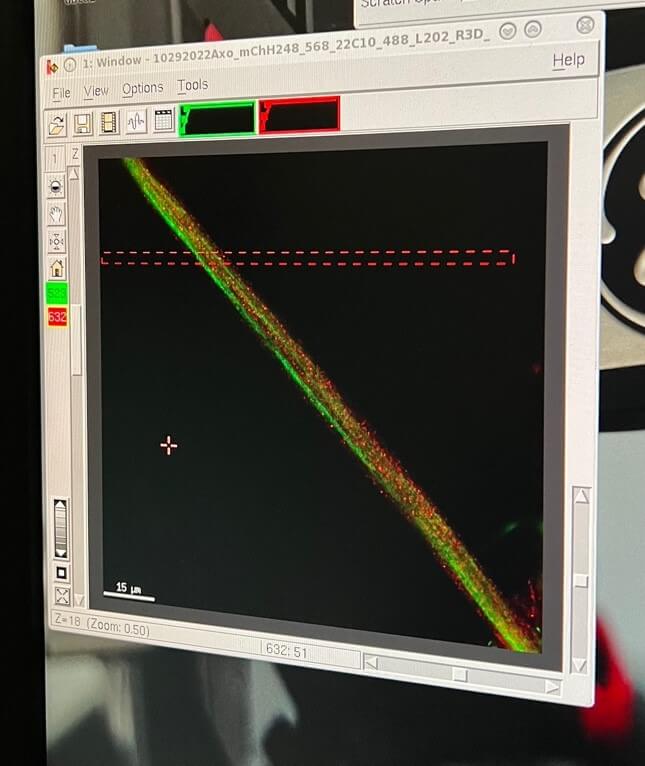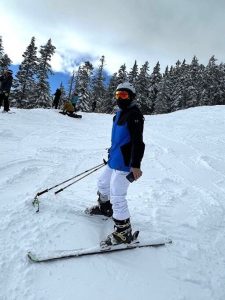
Hello! My name is Henry and I’ve just completed my undergraduate degree in Honours Biology. I am from Guangzhou, China and I moved to the beautiful city of Vancouver at the age of 12. As a part of my program requirement, I have been incredibly fortunate to be a part of the Auld Lab to conduct my Honours Research Project on peripheral nerve and glial cell development during my fourth year. In my fifth year, I continued my research project in the Auld Lab through a directed studies course.
 Throughout the 5 years of my degree, I was involved with various clubs such as the UBC Friends of MSF (Doctors Without Borders), UBC Phi Delta Epsilon, and Student Engagement/ Imagine UBC. During the past year, I took on the position as one of the Logistics and Programming Co-Directors for the 2023 Multidisciplinary Undergraduate Research Conference (MURC), which is the largest undergraduate research conference in UBC for student researchers to showcase their work.
Throughout the 5 years of my degree, I was involved with various clubs such as the UBC Friends of MSF (Doctors Without Borders), UBC Phi Delta Epsilon, and Student Engagement/ Imagine UBC. During the past year, I took on the position as one of the Logistics and Programming Co-Directors for the 2023 Multidisciplinary Undergraduate Research Conference (MURC), which is the largest undergraduate research conference in UBC for student researchers to showcase their work.
Currently, I am holding an NSERC USRA to work as a summer research assistant in the Auld Lab where I will be continuing my research as a Master’s student in September!
What are you researching?
My research at the Auld Lab is focused on understanding how peripheral nerves develop using the model organism Drosophila melanogaster, commonly known as the fruit fly. Previous work from the lab has found that a large protein complex named dystroglycan complex plays a critical role in the proper development of these nerves, and our current focus is on finding the specific signals that kickstart this nerve develop process. Through bioinformatics searches, we’ve identified several target proteins that have been suggested to be associated with conditions such as autism, schizophrenia, and increased sensitivity to pain. My project uses genetic techniques to modify the levels of these proteins, paired with high-resolution fluorescence microscopy that allows me to see very detailed images of the nerves.

Why is this research important?
The structure of Drosophila peripheral nerves is similar to a type of nerve cell found in human called unmyelinated small-diameter axons. When these cells are disrupted in humans, it can lead to certain nerve-related problems associated with diabetes, obesity, aging, pain hypersensitivity, and feelings of tingling or prickling known as paresthesia. Despite their importance, we still don’t fully understand how these unmyelinated nerves develop and stay healthy. By understanding the proteins and pathways that control the growth of these nerves, we hope to gain valuable insights that could help develop new treatments for nerve-related diseases in the future.
What do you most enjoy about doing research?
Being able to apply the knowledge that I’ve learned from classes in a hands-on research environment! I really enjoy learning to actually carry out the laboratory techniques that have been introduced to me in class. I find it interesting to discover some limitations of the lab techniques and that sometimes they may not work as well as advertised, or sometimes the results could be surprisingly good. It is the novelty and uncertainty in scientific research that drives me to be curious and perseverant as an independent learner.
What has doing research brought to your undergraduate experience?
Doing research during my undergraduate studies has allowed me to become a more independent learner. Looking back at the biology and chemistry lab courses that I took during first and second year, I’ve always conducted experiments that followed the protocols from the lab notebook, but I’ve never thought about why I was doing a particular experiment. Research has encouraged me to always think about the “why” question, as I have to know the rationale behind every single thing that I do in the lab. It has changed my attitude toward learning and enriched my undergraduate experience.
What advice would you give to other students considering doing a research project?
Definitely go for it! It is one thing to be presented with information and knowledge in a classroom setting, but it is another thing to be able to actively seek new information and to critically solve problems. As a student researcher, you’ll harness the skills necessary to become an independent learner. When it comes to finding research opportunities, it may seem a little bit scary at first to reach out to professors, but I promise you that most professors will be thrilled to hear from you. Even if you don’t end up finding a position in the lab, many professors will be delighted to share their research, so don’t be afraid to reach out! Also, I’d suggest reaching out to graduate students, such as your TAs, to learn more about their labs.
What do you like to do in your spare time?
 I love playing badminton and I’ve been a part of the UBC Badminton Club for the past 2 years where I get to play with friends, relieve some of the stress during the semester, and it helps me stay in shape. I also like skiing in the beautiful mountains of Grouse, Cypress, and Whistler.
I love playing badminton and I’ve been a part of the UBC Badminton Club for the past 2 years where I get to play with friends, relieve some of the stress during the semester, and it helps me stay in shape. I also like skiing in the beautiful mountains of Grouse, Cypress, and Whistler.
What are your plans after graduation?
I am pursuing a Master’s degree in Cell and Developmental Biology starting in September under the supervision of Dr. Vanessa Auld. My career goal is to work in the healthcare field.